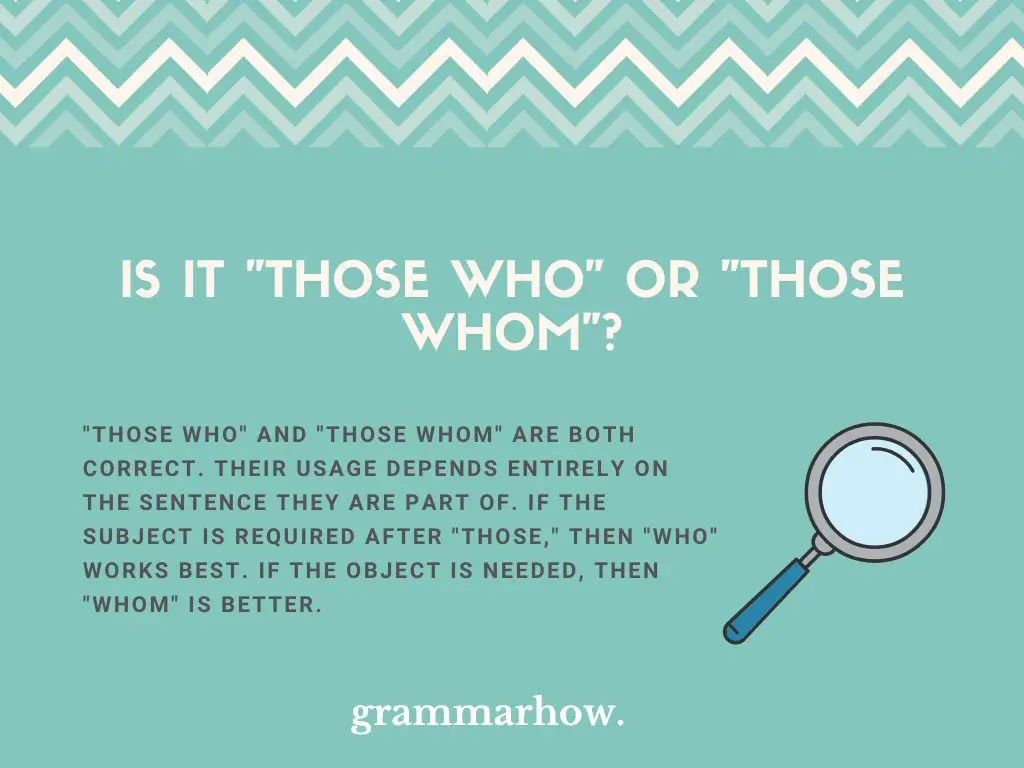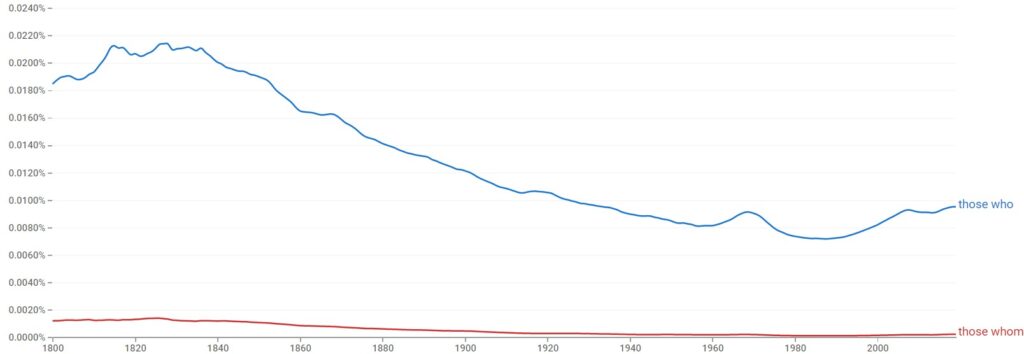“Those who” and “those whom” are both similar phrases. It would help to know which one is more suitable, and this article will explain which one is grammatically correct (and which one you should stick to using).
Is It “Those Who” or “Those Whom”?
“Those who” and “those whom” are both correct. Their usage depends entirely on the sentence they are part of. If the subject is required after “those,” then “who” works best. If the object is needed, then “whom” is better.

So, how do you work out which form is needed?
It’s fairly simple, as it depends on the rest of the sentence. The subject (those who) works best when talking about the action someone might take:
- Those who helped
The object works best when talking about the action other people would take about the object:
- Those whom everyone else helped
For the most part, the phrases are interchangeable. Most native speakers do not recognize the direct differences between “who” and “whom,” so you won’t be called out if you get it wrong (though it’s worth learning).
A general rule of thumb is that “those whom” is more formal (since it sticks to formal object rules). “Those who” is more informal because most native speakers prefer to avoid “whom” because it’s outdated and overly formal.
According to Google Ngram Viewer, “those who” is by far the most popular choice. Even though they are both correct forms, this graph makes it clear that native speakers prefer using “who” in almost every case over the more formal “whom.”

Those Who
“Those who” is correct when we’re referring to the subject. The subject of a sentence is the person that does something. Usually, a verb will follow “those who” to show the action that is carried out by the subject.
Phrases like “those who help” or “those who work” are great ways to demonstrate how the subject can work with a verb.
It’s also possible to use “who” as the object in some situations since “whom” is becoming increasingly less popular as the language evolves (you can refer to the graph in the previous section to remind you of this).
- We will refer this to those who need help with it. I think it’ll be more suitable if we do it in this way.
- I want to say it for those who can’t say it themselves. It’s all we can ever think about, and it would help to make sure we’re heard.
- I will speak for those who can’t. I have all the notes here, so I should have every right to continue.
- He can do that for those who care enough. I don’t care, though.
Those Whom
“Those whom” is correct when using the object of the sentence. In this case, other subjects are present and carrying out actions that impact the object. It’s common for a subject (like “everyone” or “people”) to come after “whom” when this phrase is used.
- We’re referring to those whom everyone else admires. We think they’re very important people to have on our side.
- It’s those whom the people care about. You should make a note of them, as they will be your friends.
- I want to talk about those whom the men and women in this company admire. That would help with our cohesion.
- It’s for those whom the people have spoken about. We should make sure to respect everyone’s feelings.
Those Which
“Those which” is a more general experience. It works best when referring to items and objects. “Who” and “whom” are limited because they only refer to people. “Which” refers to just about everything else, making it a good choice in many other situations.
- We’re referring to those which need the most repairs before sending them off for the people. It’s important we get these done.
- It’s about those items which need recovering. We need to be certain that we can find them all before it’s too late.
- Those which are laid out in front of you will be the objects we can use for this team-building project. Good luck!
- Those which you see before you are going to be your new utensils. Have fun!
Final Thoughts
“Those who” works when referring to the subject of the sentence, while “those whom” works when referring to the object. Both are correct, but it’s much more likely that you’ll come across “those who.” If in doubt, you should stick to using “who” in most cases.
You may also like:
“Who Else” or “Whom Else”? Correct Version (With Examples)
“People Who” or “People Whom”? Correct Version (+Examples)
“Who Are You Staying With” or “Whom Are You Staying With”?

Martin holds a Master’s degree in Finance and International Business. He has six years of experience in professional communication with clients, executives, and colleagues. Furthermore, he has teaching experience from Aarhus University. Martin has been featured as an expert in communication and teaching on Forbes and Shopify. Read more about Martin here.
